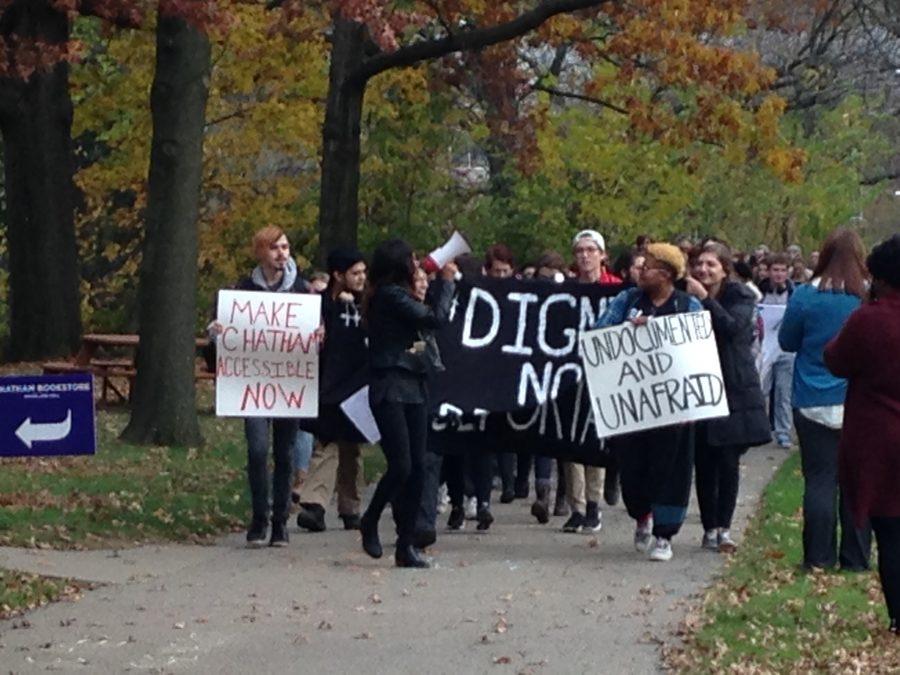Author: Emma Honcharski
Over 50 Chatham University students filtered out of their classrooms at 3 p.m. on Wednesday November 16 to meet on the Quad, taking part in a nationwide movement of walkouts at colleges and universities as a response to President-elect Donald Trump’s anti-immigration policies. The walkout and peaceful protest called on administration to identify Chatham as a sanctuary campus.
Multiple students spoke to the crowd about their personal motivations and the importance of taking a stance against Trump’s policies, and their opposition to the discrimination his administration perpetuates, followed by a march across campus.
Maria Duarte, a senior Psychology student, organized the event as part of the Cosecha Movement’s call to action for campuses across the country.
“It’s simple,” said Duarte. “We just want a statement from Dr. [David] Finegold that says that Chatham will be a sanctuary campus, and that it will provide permanent protection for undocumented people and other vulnerable communities.” The movement references an official memo released in 2011 by U.S. Immigration and Customs Enforcement (ICE) that places restrictions on enforcement actions at sensitive locations, including schools and places of worship.
“A lot of people don’t have the opportunity I’ve had to have an education as an undocumented person (…) I feel like I have the responsibility to say something, to fight for those who have been oppressed and for those who are suffering,” Duarte said of her involvement in the movement.
“What we’re fighting here is something much, much bigger than politics and something much, much bigger than a president,” said Duarte.
The election results are a driving factor for students who participated, though. “The fact that we’re going to have a fascist as president, the fact that he wants white supremacists in his Cabinet, the fact that he wants to deport a great deal of this country,” Rebecca Emerik, a first year Creative Writing student, said of her motivation to be a part of the action.
“I think the results of the election have left a lot of people fearing for their lives and for their livelihood, and I think we’re kind of safe in this Chatham bubble where we feel accepted, and we feel that we can live our lives as we want to, but there are so many people around the world that don’t,” said Allison Albitz, a senior Creative Writing and Journalism student. “I think the election sparked [the movement] but I also think this is something that has been going on for ever.”
The action was met with support from the administration – many professors excused students from class, and an event aimed at first years was rescheduled later than originally planned, to allow students the option to participate in the walkout.
“Some schools aren’t going to have that privilege, but as a Chatham community, because administration was kind of behind us, we really did stand in solidarity with the movement,” said Albitz.
The generally democratic and progressive climate of Chatham generated different responses to the impact of the action. “This was a mainly blue campus, and if you really wanted to have this heard, go to a red campus,” said Sabrine [last name withheld], a junior Biochemistry student, who watched the action from the other end of the quad.
“Who’s gonna hear about this? What congressmen, what representative, who’s gonna hear about this, on a campus that’s already small and that’s already a very tiny speck on the map in terms of Pittsburgh, I just feel like it could have been executed in a better way,” said Hannah [last name withheld], a senior Biology student.
Though, the support from the university provided a stronger sense of solidarity and comfort for others. “It is kind of nice knowing how many professors and administrators are on board with this and how many want to support this, it just makes me kind of glad that I’m at Chatham, that we as an institution support these kind of things,” said Teri Bradford, a junior Journalism student.
Duarte considered the turnout of the action successful, and is hopeful about President Finegold’s involvement.
A week after the action, Professor Jennie Sweet-Cushman sent out a campus-wide email with a letter addressed to President Finegold and Chatham University Board of Trustees, signed by herself and 76 other members of the Chatham Community. The letter requested for the Board to consider establishing Chatham as a designated sanctuary. Within the following days, faculty members continued to reply to the email voicing their support, asking for their names to be included in the letter.
President Finegold responded that the Cabinet has started to investigate what Sanctuary Campus status would mean for Chatham. “Such a decision has important ramifications for the University and will involve discussions with our Board and other stakeholders in the Chatham community,” his email read.
“He really cares about the community and he pushes diversity, so I don’t see why not,” Duarte said, “this isn’t a hard ask on our part, it doesn’t take much to declare the university a sanctuary.”
According to PublicSource, Pittsburgh is considering becoming a sanctuary city, to support the actions of the Pittsburgh City Council that have maintained similar ideals to the official sanctuary status since 2014. The list of sanctuary cities across the country may be growing, joining an already significant list, including New York City, Washington D.C., Los Angeles, Detroit and Chicago.
“The undocumented community is scared to death right now, and I think more now than ever it’s important to speak out about these issues and bring them to light.” Duarte said.
Within the past two weeks, 28 universities across the country have been established as sanctuary campuses. Given the interest shown by both students and administrators, Chatham may be on its way to becoming the 29th.
Sanctuary campus: campus that protects undocumented immigrants from deportation by limiting cooperation with federal immigration authorities – similar to sanctuary cities, there is not a specific legal definition


